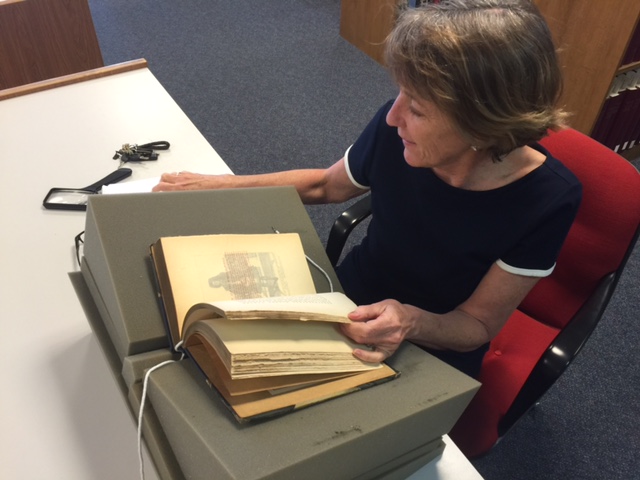Since she began at SLU in October 2015, Dolores Byrnes has been thinking in centuries. When I met her in the University Archives on April 18, she announced that she had just entered the 20th century. Before her were books containing students’ math problems and a visitor’s sign-in book featured in the SLU exhibit of the 1904 World’s Fair education pavilion. Byrnes pointed out the name “Padberg,” 44 of whom have gone to SLU.
Byrnes is currently writing a history of SLU for its upcoming bicentennial in 2018. President Pestello recruited her for the job based on their past collaboration. “I worked with Dr. Byrnes at Le Moyne College, where she served in several roles, including researcher and writer,” he said. “I admired her skills in these areas and when this opportunity arose for an author here at SLU, I talked with her about it.”
Byrnes interviewed with the Bicentennial Committee, which ultimately hired her. Of the finished work, Pestello said, “I am expecting the book to be a detailed and exciting history of the first 200 years of our University.”
“He respects that I’m going to take everyone seriously, and really try to just be respectful,” said Byrnes. “That’s something we tried to do at Le Moyne, listen to everybody and tell their story with respect.”
Byrnes, who has a Ph.D. in anthropology, left Le Moyne in 2012 to teach in Bangladesh. She did freelance work in Arlington, Virginia, and volunteered by teaching disabled children to swim.
When discussion moves to her work, Byrnes demonstrates a keen, intimate familiarity with the names, dates and minutiae of SLU’s history. “Part of the thing about doing the history that’s so cool is to see how the history of St. Louis itself, is really, really closely linked with the University,” she said.
Recounting those 200 years, she offered vivid depictions of SLU’s most distant origins. She spoke of “DuBourg climbing off a boat to this muddy frontier town.” Our founders were, in Byrnes’ words, “19-year-old guys with Greek and Latin dictionaries” who snuck out of Belgium without even telling their parents. One of those six wrote that they were “sailing almost at random” aboard the Columbia, on Assumption Day.
An average day for Byrnes involves extensive reading, browsing through archives or interviewing various people. Last month, she invited me to sit in on an interview with two relatives of Claude Heithaus, S.J., who in 1944, in St. Francis Xavier Church, delivered a landmark sermon against racism.
On weekends, she explores the city on foot. She makes an effort to take part in campus events, too: I met her in person for the first time at TEDxSLU in January. Indeed, the present features prominently in her concept of the book. “I love to think of the 200 years as sort of culminating in all this intellectual ferment,” she said. “I like to be able to have it be relevant now.”
Byrnes is negotiating a publishing contract. She will request a bid in July, pick a publisher and then go through the first draft. She has written three of the manuscript’s seven chapters, but has already compiled material for the final one. While some colleagues involved in the bicentennial envisioned a coffee table-style book, Byrnes hopes to achieve a balance of complex, compelling history and glossy images. “Obviously, history isn’t that shiny,” she said.
She wants to tap into SLU faculty that might want to contribute to the book, but students’ perspectives hold equal value. “I think it should [interest them],” she said.
Byrnes projects the book going to print in spring 2017, with a release that fall.
“I could just talk about this for days. I have no friends left … they don’t want to know,” she joked.
The Jesuits are a source of consistent fascination for Byrnes, who admires their “discipline” and “rigor”. She considers them contradictory figures, bound by rules and vows yet independent in their thinking.
Having read the Board of Trustees’ minutes up to the 1940s, Byrnes said that the Board discussed admitting African-American students as early as 1910. “The SLU Jesuits were thinking ahead of their time,” she said. “This has been a forward-looking institution for a very long time, and intellectually very sophisticated.”
As the University faces 21st-century obstacles in a turbulent economy, Byrnes referred to the past for a grounding perspective. She explained that SLU “almost went under” in Feb. 1833, after the Jesuits’ Secretary General allowed Jesuit schools to charge tuition. She listed other “miracles” of survival, through the fire of 1849, the cholera outbreak, the Gasconade train wreck in 1855 and the Civil War. “SLU just passes through it peacefully,” she said.
The nature of Byrnes’ work means she still simultaneously has a century and several months of research ahead of her: more books, more archive perusals and more interviews.
“There’s a lot of serendipity to it, and that’s the beauty of being able to just do this,” she said. “I try to remind myself that when your timeline is eternity, it’s just not a straightforward story.”
The 200 years of institutional history aside, Byrnes intends to enjoy herself pursuing a cohesive, seven-chapter narrative. “Try not to convey that I’m having too much fun, because people might get jealous.”






